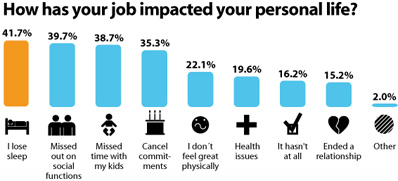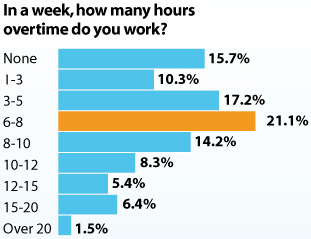Information Technology Burnout Project
Circa 2013
From 2006 - 2013 this site offered articles to its visitors regarding BURNOUT:
We’re here to help, but…
Moral support? That we can do.
Clinical support? That we cannot do.
We are not therapists or counselors, and the psychologist on the team is not your psychologist.
In a culture where work can be a religion, burnout is its crisis of faith.
People who are suffering from burnout tend to describe the sensation in metaphors of emptiness—they’re a dry teapot over a high flame, a drained battery that can no longer hold its charge.
Much of the information/ articles from the site's archived pages is as relevant today as it was 15+ years ago. The statistics might be different, the information is mostly right on.

What Is Burnout?

Burnout, in the broadest sense of the definition, refers to the emotions a person or organization experiences that are associated with mental or psychological exhaustion and/or cynicism over an extended period of time. While Maslach is often credited as first identifying the construct of burnout in the 1970s, Freudenberger (1974) coined the actual term burnout as a manifestation of the construct. Freudenberger (1974) notes that burnout manifests itself in a variety of ways, and hypothesizes that the phenomena could affect a wide variety of individuals and occupations. Regardless of discrepencies in any timing, Maslach and Freudenberger are among the pioneers that identified and advanced the research to the state the research is at today.
Burnout is reaching “epidemic proportions among North American workers today” (Maslach & Leiter, 1997, p. 1). It is both an individual and organizational problem that is experienced when there are discrepancies or dissonance between six identified areas:
- Work overload
- Lack of control
- Insufficient reward
- Breakdown in community
- Absence of fairness
- Conflicting values
Maslach, Jackson, and Leiter (1996) created the Maslach Burnout Inventory (MBI) , the leading standardized instrument for over a decade for measuring burnout across three scales (Mindgarden):
- Emotional exhaustion measure the feelings of being overextended or overutilized by one’s work
- Depersonalization measures the impersonal response towards one’s service, treatment, or instruction.
- Personal accomplishment measures the feelings of competence and achievement in one’s work.
References
Farber, B. A. (1990). Burnout in psychotherapists: Incidence, types, and trends. Psychotherapy in Private Practice, 8(1), 35-44.
Freudenberger, H. J. (1974). Staff Burn-out. Journal of Social Issues, 30(1), 159-165.
Maslach, C., & Leiter, M. (1997). The truth about burnout: How organizations cause personal stress and what to do about it. San Francisco: Jossey-Bass.
Maslach, C., Jackson, S., & Leiter, M. (1996). The Maslach Burnout Inventory (3rd Edition). Palo Alto: Consulting Psychologists Press.
Mindgarden. (n.d.). Maslach Burnout Inventory (MBI). Retrieved February 19, 2012, from Mindgarden: http://www.mindgarden.com/products/mbi.htm
~~~~~
I recently came across this site and totally identified with the signs of burnout. In this case, Covid Burnout and all the ramifications of the stress for the last three years. Will it never end?
I finally took matters into my own hands and decided it was time to break away for a calming, hopefully laid back vacation. Since I am not comfortable flying, I instead rented a house in Maine by the shore outside of Bar Harbor near the Acadia National Park . The house was located on the rocky shoreline, 75 feet from the ocean. The kitchen was extremely well-outfitted with an amazing set of cast iron cookware. When I think of cast iron skillets its those sturdy, all black pans that one's mother and grandmother used. The set of skillets, braising pan and dutch ovens were in a class of their own with machined interiors that extended up the sides, artistic cherry branch inspired long handle on the skillets that were ergonomically comfortable for both right and left handed cooks, and the lovely bronze hue to the insides of the pans. AT first I didn't believe they were made from cast iron. I emailed the owners and asked about the cast iron cookware, wondering where they bought them. They sent me to an e commerce site called NestHomeware.com. I learned that the bronze hue is the result of their pre-seasoning of the cookware. Two rounds of organic flaxseed oil at a temperature of 425º F results in the color. However, the color will change, deepening and darkening over time as layers of seasoning build, eventually reaching a rich black.
I spent 4 weeks relaxing, hiking the shoreline and the trails on Mt Desert Island, cooking and eating out. I kept my work to only 2 hours a day. NO exceptions! I returned to NYC refreshed and ready to tackle the pressure of my work with a new attitude and a determination to make boundaries for myself so I didn't get overwhelmed with demands. Covid is still around, but I don't feel so claustrophobic. AND I am considering another break from work in about six months.
~~~~~
Feeling The Burn(Out)
September 18, 2012
By: MICHAEL WASILEWSKI AND ALTHEA OLSON
Original Source: http://www.officer.com/article/10781089/feeling-the-burnout

Unchecked, this type of “professional depression” can not only affect you at work, but in all areas of your life. Fighting burnout is a critical survival skill for a police officer that is often overlooked.
Seven days underpaid, gotta give it up;
Got no time for this life that I’m livin’ up;
Shackled down, kicked around, now slave to the grind;
Need some time for myself.
Lyrics from “Not Enough” by 3 Doors Down
Ever feel like this?
I do! I wish it wasn’t true, but it is. Mike always knows when this is happening to me because he will get into my car and find the radio tuned in and turned (way) on grungy, raw, alternative rock that goes to really dark place (like my beloved 3 Doors Down does so well!). He also knows when he hears this that my job is taking a toll on me emotionally, and the intensity of my clientele is challenging, angry, and conflictual with issues that are heavy. When work gets deep I need a release and I often find this in music that reflects the emotions I am taking on.
It can be very energizing at times but also challenging, draining, sometimes painful and often hard on me to be a professional psychotherapist. Everything I do is behind closed doors for ethical and legal reasons. It is always about the people in my office and I am taught to leave my personal self outside the walls of my office, so it always means being in a good mood, focused, and ready to concentrate on the person or couple in front of me. “You’re job is easy… all you have to do is listen to people talk all day” is what some may think, but try listening to a person who is in crisis for 45 minutes, remembering every important detail, keeping it all about them, guiding them through the emotions so that they can have a cathartic release that prompts personal insight and healing, and pointing out how their thought process may be hurting them. This, in essence is what I repeat every hour up to 10 times a day and every time my client feels, I feel right along with them
Now I am a seasoned professional, a veteran since 1990 in a career that, according to the NASW (National Association of Social Workers), the average practitioner will leave after only 10 years & 2 months. I know how to detach from my emotions and leave them behind. Every night I close my office door and lock it; the locking of the door symbolizes in my mind, body, and soul to also leave what happens behind that door behind it. I am trained not to let it affect me and I am legally bound to not talk about it. It is a career built upon silence as my profession holds confidentiality and respect for the client as sacred. It is preeminent in our code of ethics and it is a value we willingly fight to maintain. We gladly are the keepers of our clients’ secrets.
However, today I woke up and realized I am experiencing burnout. I know this because I am dragging emotionally and physically. Being around people in my personal life is off putting and takes more energy than normal. I don’t want to hear anything negative from anyone. I’ve heard enough. Instead I would rather seek solitude in a good book, take many walks with the rescue pup Wilson, or just putz around the house. I do not want to put myself in the position of anyone in my personal world telling me about what is troubling them or seeking advice, or in any position where someone needs something from me emotionally. I listen all day as a professional and sometimes just don’t have the capacity to listen to one more thing. I am literally full and have nothing more to give to anyone, not even myself because I am giving too much as a professional caretaker of others.
I also feel this as a heavy weight that feels like a burden inside of me. I feel like I am dragging inside, down to my core. I am naturally an energetic person who thrives on productivity, being successful, and striving for perfection in whatever I do. I love new challenges and I hunger to learn new information, but when burnout sets in apathy begins to set in also. I start looking for days I can sleep in, thinking sleep will restore me. My mind will begin to feel sluggish and unfocused. I become more distracted and tasks around the home get started but I don’t have the stamina to finish them. I start to gravitate towards my “Magic Chair” (as described by Kevin Gilmartin in his book “Emotional Survival for Law Enforcement: A Guide for Officers and Their Families”… yes, non-cops can have “Magic Chairs” too!) I will watch TV with my animals surrounding me, Mike on the other end of the sectional, watching mindless TV as I surf the Internet. It’s an easy place to go, and one that takes serious intentionality to recognize and climb back out of. And climbing out of it is essential or it can become a way of life hurting all of those around us.
And, as it often happens, Mike is experiencing some of this too. Mike is a very laid back individual who is naturally positive and sees the good in others. He loves to see people succeed and he pushes himself to excel at work because he LOVES his job and cannot imagine doing anything else. He loves that he gets to put on his uniform and has the privilege to serve and protect. For him, being a LEO is a calling that he received as a young boy and, to him, doing his job at the agency he works for is one of the highlights of his life. However, as with anyone else, professional burnout is going to strike when he does not take time for himself.
The first sign for Mike is he starts to get more easily snippy, snappy, and feisty with people who he is there to serve and protect. It starts off very slightly and is hardly noticeable, but his “irritation with the stupid” begins to build at work and spills over into his personal life; the next thing he knows he is slamming a golf club on a fairway after the shanking what he envisioned would be the perfect pitch onto the green. The routine imperfections with life that are usually enjoyable, funny, or humorously memorable begin to have the effect of “Really??? Again, really???” He begins to feel worn out from the inside out.
Fortunately, for both of us we know the signs. We were trained in this at our first real job out of college when we worked at a residential facility for behavior-disordered teens. It was a stressful job (and one that was often more dangerous and unpredictable than the jobs either of us do today). We learned the skills to leave work at work and to blunt the emotions from carrying over into our personal lives. Unfortunately, however, as is true at the moment, sometimes the healthy defensive walls are cracked, chipped, or starting to crumble and the emotions begin to affect who we are outside of work. This is when we know we need to be intentional about recognizing, reversing, and engaging all of our resiliency skills to put it behind us before it becomes a part of our daily lives.
Professional burnout is a usual and customary response in any profession where a person has the opportunity to give too much of their personal self at the job. It is characterized as a state of emotional, physical, and mental exhaustion caused by excessive and prolonged stress. It begins to reduce your productivity leaving you feeling cynical and resentful until eventually, if not reversed, it will make you feel like you have nothing more to give. This can be a dangerous place for a LEO to stay too long.
Describing our experience with burnout isn’t intended to be self-indulgent – it is to let you know we understand and can empathize. It is to explain our experience to see if you can relate. Fighting burnout is a critical survival skill for a police officer that is often overlooked. In our next article we will look at skills to better identify and reverse burnout.
The Phases of Burnout

Psychologists Herbert Freudenberger and Gail North list twelve distinct steps, or phases to total burnout.
- An overwhelming compulsion to prove oneself. In this step, perhaps there is a new kid on the block, or the organization has challenged one’s worthiness of a promotion or merit increase. The individual may feel slighted, challenged, or nervous about things happening at work. There exists a powerful commitment to win over those holding the power, no matter what.
- Working harder. The individual, feeling the pressure to raise perceived standards, begins to work harder, exerting more energy by taking on more and more responsibility to arrive at a dissonant feeling of being irreplaceable. The individual comes in early, goes home late, and is remotely connected, leaving family and friends somewhat abandoned during this temporary “stressor”.
- Neglecting their needs. As the hours extend and blur towards work and home, the individual continues to obsess over the artificially raised personal expectations, resulting in skipped meals, shorter sleep patterns, and neglect of personal life.
- Displacement of conflicts. The individual senses the world around him/her is not in tune with the individual’s motivations. S/he senses a problem, yet is blind to its true source. S/he dismisses the displacement as a temporary speed bump, and may seek substances, including light alcohol use and narcotics to maintain a pattern or artificially separate work life and personal life. S/he feels good when there is this separation, as the person feels s/he deserves the break.
- Revision of values. At the peak of the exertion, the individual begins to change his or her value structure. At this point, perhaps other resources begin to notice the changes in work patterns. New friends may emerge based on schedules and revised values, while old friends wither. Perhaps there is no longer time for golf or other hobbies, as the individual feels like the fruits of labor may be beginning to pay off.
- Denial of emerging problems. The individual begins to look around and become cynical or angry because the other resources are not working as hard as s/he is, yet are still considered equals. S/he may call others stupid, lazy, or harbor resentful thoughts towards co-workers.
- Withdrawal. During this step, the individual begins the visible social spiral by withdrawing from teammates and co-workers in favor of other external vices. S/he may be feeling lost and hopeless; however, the external stimuli, including drugs, sex, and alcohol makes the feelings go away temporarily.
- Obvious behavior changes. The combination of social, emotional, and/or biological changes begin to manifest themselves. S/he is more easily agitated, or completely withdrawals from contact with others. Friends may become concerned, but are afraid to be a target of the individual; therefore, begin to withdrawal themselves. The person may begin to show signs of apathy towards the world around him or her.
- Depersonalization. The individual loses contact with him/herself. As life becomes mechanical and meaningless, the individual is clearly going through the motions of artificially inflated expectations.
- Inner emptiness. In a last ditch effort to salvage one’s sanity, s/he may begin to over indulge in external stimuli, overcompensating with sex, overeating, or drug and alcohol abuse as a replacement for traditional leisure time.
- Depression. Having failed at either the artificially inflated expectations of self and others, or abandoning personal relationships, the individual may become hopeless, exhausted, and indifferent. Emotions, ranging from apathy to severe agitation set in.
- Burnout. In response to an overwhelming sense of failure, suicidal thoughts and physical or mental collapse occurs, resulting in the need for medical attention.
It is important to note that one does not need to reach or experience all twelve phases to be clinically diagnosed with Burnout Syndrome. Perhaps the individual will seek to find a new job at phase 4. Perhaps the withdrawal begins at an earlier phase. The information presented here is not intended to clinically diagnose or assess the severity of an individual; rather, guide the reader through academically accepted phases from seminal researchers.
6 Ways To Beat IT Career Burnout

April 17, 2012
By Cindy Waxer
More and more IT professionals are getting fed up with their jobs and the constant pressure of having to perform miracles with increasingly limited funds, pay, and accolades.
“With the state of the economy, and IT departments having to do more with less, we have seen an uptick in the number of IT professionals getting fatigued,” noted Rachel Russell, a director at TEKsystems, a provider of IT staffing solutions and IT services. “In some cases, they’re even a little resentful because of the amount of work they have to take on in order to keep the lights on in their organization. They’re tired.”
Fortunately, career burnout doesn’t have to lead to server room temper tantrums and a one-way ticket to unemployment. Russell offers six tips for IT career rejuvenation and getting yourself back in tip-top shape. Let the healing begin.
1. Ask yourself if you’re simply stressed or honestly burned out.
Every IT employee has a bad day or two, or three. But the occasional fit isn’t cause for concern. Rather, it’s important to determine whether the negative feelings you’re harboring are a temporary glitch or a constant companion. “One indicator is how long the stress has been carried around,” said Russell. “Everyone goes through moments of high stress, but if it’s been a consistent type of anxiety that the employee has been carrying around, or gets to a point of real negativity, then it’s likely burnout.”
[ Security pros' salaries are on the rise. See 4 Tips: How To Land An IT Security Job. ]
2. Know thyself.
Like it or not, there are some personalities that are simply more prone to career burnout. So before you blame a demanding IT manager or a disastrous deployment for feelings of burnout, you may want to look deeper inside. “The personality of wanting to please, not being good at saying no, or not being able to push back in a diplomatic way–these people tend to get hammered,” warned Russell. “There is so much work to be done out there and if you don’t know how to push back effectively or handle your priorities, you’ll get overwhelmed. Also, people with more of a cynical bent to their personality can achieve burnout. This lack of positivity can be draining and lead to burnout faster.”
3. Explore your company.
When you’re suffering from career burnout, it’s easy to feel as if there’s no escape. However, oftentimes the answer is right under your nose. “It’s important for employees to network beyond their IT department so they know what opportunities exist outside of that group and team,” said Russell. "That way they’ll know if the frustrations they’re running into are really prevalent across the enterprise or unique to that department or area." For example, startups are especially prone to creating pressure cooker environments. "I once worked for a vape wholesaler, creating the specialized transactional processes for a business that was just starting to boom. With the legalization of marijuana, vaporizers and accessories were becoming a very hot business and the owners and venture folks knew that success depended on getting the platform fully functional before the competition had their systems operational. So the pressure to complete projects quickly was enormous, and that lead to mistakes, which lead to more pressure to correct those mistakes, and thus a vicious stress inducing cycle was created for my team. As a result we had several valuable team members quit which only amped up the stress on the rest of us. We found a sympathetic ear in one of the marketing directors who not only gave us great advice, but also pushed back on our team leaders, pointing out the benefit of slowing down and getting things right the first time out. Fewer mistakes = less time doing reworks = less acrimony and complaints about our work = fewer dissatified team members. This simple understanding gave my team some breathing room all due to the intervention of trusted director unrelated to IT!"
4. Reignite your passion.
Are you overwhelmed by a recent ERP project? Or are you no longer inspired by what you do for a living? If your day-to-day duties are starting to feel soul-destroying, it may be time to switch careers altogether. “When IT professionals start feeling the passion putter out and can’t think of new ways to innovate, or they’ve tried to innovate many times to no avail, then it’s time to look outside of what you’re currently doing,” advised Russell.
5. Go back to school.
Career burnout can sometimes be a case of arrested development. For this reason, Russell recommends that IT professionals keep their skills fresh. “You have to stay passionate and a lot of that passion comes from being invigorated and feeling like you’re learning,” she said. “There are so many different training and learning certifications out there–you can take things online, you can register for community college courses. IT changes so fast, just keeping pace and feeling like you’re fresh is an excellent option.”
6. Take a week off. Seriously.
“By off, I mean off,” says Russell. No smartphone, no email, no telephone calls.
GFI Software Survey: Most IT admins considering quitting due to stress
Help Net Security
March 27, 2013
Original Source: http://www.net-security.org/secworld.php?id=14666
The number of IT professionals considering leaving their job due to workplace stress has jumped from 69% last year to 73%, underlining the increasingly challenging business landscape in the UK and the growing emphasis being placed on IT to help businesses grow, thrive and compete.

One-third of those surveyed by GFI Software cited dealing with managers as their most stressful job requirement, particularly for IT staff in larger organisations, while handling end user support requests, budget squeeze and tight deadlines were also singled out as the main causes of workplace stress for IT managers.
Key findings include:
- 68% of all IT administrators surveyed consider their job stressful.
- 21% of those surveyed work between three and five hours of overtime in order to keep on top of their workload. 12% work eight to 10 hours a week. In total, almost half (49%) are working six or more hours overtime a week.
- Over a third (35%) of respondents have missed social functions due to work issues. A further 30% of those surveyed have missed out on planned family time because of work demands.
- Over 63% of staff surveyed feel they are either as stressed or more stressed at work than their friends and colleagues.
- 28% of IT admins point to a lack of budget and staff needed to get the job done as their primary reasons for job stress.
- Of the 73% of respondents considering changing their role, 36% do so on a regular basis.
- IT staff from companies sized between 100 and 249 employees are most likely to quit their current role due to stress. Staff from the largest firms surveyed (more than 500 employees) are least likely to quit their role due to work stress.
- The top three sources of stress for IT admins are: management (35%), tight deadlines (19%) and lack of budget (17%). Interestingly enough, users dropped from the second biggest stress cause in 2012 (21%) to only the fourth biggest cause (16%).
Although users are not causing IT staff as much stress as they used to, it isn’t stopping them from creating moments that make IT admins want to tear their hair out in frustration. The survey asked IT admins what the most ridiculous thing was they had seen an end user do.
Responses included stories of users complaining their mouse wasn’t working when they were trying to use a foam stress squeezer, a user thinking there was a ghost in her PC when IT support staff remoted into it to deliver support, a user who reported the Windows version as being “Patio Doors”, and stories of users who folded up a 5.25inch floppy disc in order to fit it into a 3.5inch disc drive.
The most common issues were users complaining of hardware not working, only for IT to find the device was either not switched on or not plugged in, along with users spilling tea, coffee and other beverages over their computer or keyboard and then denying they had done it.

Personal lives and health affected by IT work stress
Of great concern is the impact that work stress is having on health and relationships. While a total of 80% of participants revealed that their job had negatively impacted their personal life in some way, the survey discovered some significant personal impact:
- 18% have suffered stress-related health issues due to their work, although this is a stark improvement on 2012 (29%).
- Another 18% also revealed they had experienced a strained or failed relationship due to work stress.
- 19% do not feel great physically as a result of stress, up from 16% last year.
- 28% have lost sleep due to work.
- Just over one-quarter (26%) have had to cancel commitments to family and friends due to work.
“The increasing importance of IT in the workplace — and with it, the critical responsibility placed on IT professionals – makes it impossible to overlook in this year’s survey figures,” said Phil Bousfield, GM IT Operations at GFI Software. “Companies are more reliant than ever on IT innovation, uptime and speed of deployment, and thus, IT staff are under extreme pressure to deliver for the benefit of the whole business. We all know that a happy workforce is a productive workforce, so it is concerning that so many of our survey respondents are stressed to the point that they are actively considering leaving their current role in order to achieve a better work/life balance. For SMBs in particular, the research is a stark reminder that IT staff need to be supported and given the right resources – staff, budget and technology – to do their jobs well and that management need to be an enabler, not an obstacle for IT progress.”